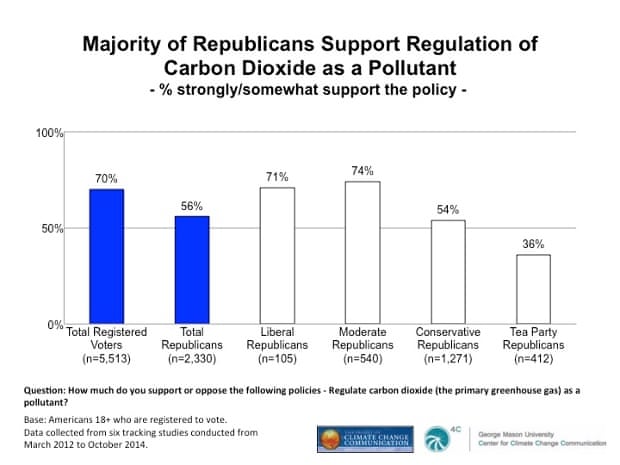 Results of a recent Yale/George Mason Universities poll of American political conservatives.
Results of a recent Yale/George Mason Universities poll of American political conservatives.The US Environmental Protection Agency is in the process of creating regulations on carbon pollution from power plants, and Republicans in Congress hate the idea. Surprisingly, a majority of Republican voters support these regulations, with Tea Party members being the only exception.
 Results of a recent Yale/George Mason Universities poll of American political conservatives.
Results of a recent Yale/George Mason Universities poll of American political conservatives.
Nevertheless, Republicans in Congress badly want to kill those regulations. However, they’re pursuing the avenues with the lowest chances of achieving that goal.
It’s important to remember that the EPA carbon pollution regulations are legally mandated. In 2007, the US Supreme Court ruled that if it determined that carbon pollution poses a threat to public health or welfare, the EPA would be required to regulate emissions of that pollution under the Clean Air Act. In 2009, the EPA issued its endangerment finding, citing several comprehensive climate science reports, correctly concluding that carbon pollution poses a threat to public health and welfare and must therefore be regulated.
So while some Republicans in Congress have called the proposed carbon pollution regulations an “executive overreach,” in reality the EPA is simply implementing the law of the land.
Senate majority leader Mitch McConnell (R-KY) introduced legislation last year to block the EPA regulations. But even if that bill could make it through Congress, it would face a certain veto by President Obama.
There’s another effort to challenge the EPA regulations in court. These recently made headlines because they involve Laurence Tribe, for whom Obama was a research assistant at Harvard. Tribe has argued that the EPA regulations violate Section 111(d) of the Clean Air Act, and the DC court of appeals has just agreed to hear the arguments.
However, the chances of success for this legal challenge are extremely slim. NRDC attorney Benjamin Longstreth told me,
I would not read anything into the Court’s decision to schedule argument. The case has not even been briefed yet (that’s ongoing) so the decision to schedule argument doesn’t reflect anyone’s view of the merits of the case (the judges who are going to decide the case won’t even have the briefs yet) ... But it is important to remember that these cases are fatally premature (an issue that Tribe doesn’t address). You can only challenge a final agency decision. Here the petitioners seek to challenge a proposed rule.
Tribe’s main argument lies in the claim that Section 111(d) of the Clean Air Act says that the EPA can’t regulate an air pollutant if it’s already regulating another pollutant from the same source. The EPA already regulates mercury emissions from power plants. However, this is an inaccurate reading of both the letter and intent of the law. Moreover, as Longstreth and his colleague David Doniger have explained, the Supreme Court has effectively already ruled on this issue (emphasis added).
This is how the Supreme Court interpreted the provision in American Electric Power v. Connecticut. There the Court held that plaintiffs could not bring a federal tort action against major electric power companies for their emissions of carbon dioxide, because the Clean Air Act authorized EPA to regulate power plants’ carbon dioxide pollution under Section 111(d).
While efforts to block or challenge the legality of the EPA carbon pollution regulations are all but doomed to failure, there is one way that Republicans in Congress could get rid of those regulations at any time. President Obama told Congress that if it didn’t act to address the threat of climate change, he would. But he and congressional Democrats would rather take action via a free market solution.
With support from just a few of its Republican members, Congress could pass climate legislation that would replace the EPA regulations with a carbon pricing mechanism. Efforts were previously made (but failed by a slim margin) to implement a carbon cap and trade system. More recently, a revenue-neutral carbon tax has become the favored policy, especially among conservatives.
Posted by dana1981 on Tuesday, 3 February, 2015
 |
The Skeptical Science website by Skeptical Science is licensed under a Creative Commons Attribution 3.0 Unported License. |